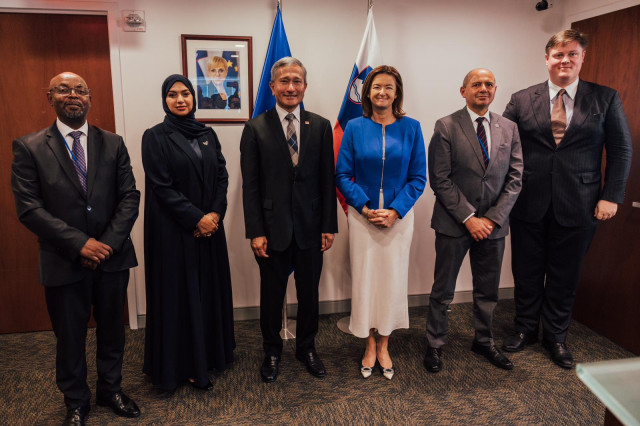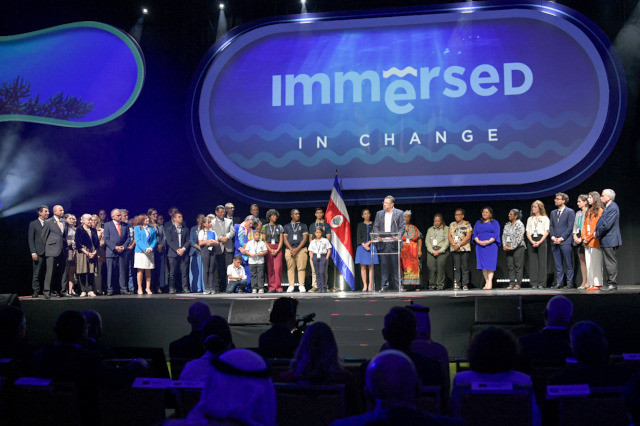This year marks a pivotal moment as the year of the triple COPs, in which the conferences of the Parties under the three Rio Conventions — on biological diversity, climate change, and desertification — are taking place in consecutive months. While the CBD COP 16 in Colombia is behind us, the world is preparing for the UNFCCC COP 29 in Azerbaijan in November and the UNCCD COP 16 in Saudi Arabia in December.
These three COPs are key forums that contribute to addressing the interconnected elements of the ongoing triple planetary crisis - biodiversity loss, climate change, and pollution. These issues are severely damaging the planet and are threatening to drastically reduce quality of life in the coming decades unless immediate, coordinated action is taken to find solutions and protect what can still be salvaged.
Action must therefore be coordinated at the international level through a cross-sectoral approach that includes science as well as international collaboration. This has been a core principle promoted by the Green Group since 2009, highlighting the importance of foreign policy in driving the collective actions needed to address the planet’s most pressing environmental challenges. The outcomes of these COPs will shape the global trajectory of safeguarding ecosystems and securing a sustainable future for generations to come.
The aligned scheduling of the Rio Conventions offers a unique opportunity to create a more cohesive and impactful global environmental agenda by bringing together diverse stakeholders from across sectors and regions. Furthermore, it fosters exchange of knowledge, resources, strategies, and innovative solutions tailored to the unique needs of different ecosystems and communities. By aligning the efforts of governments, businesses, civil society, Indigenous Peoples, and scientific communities, the conferences enhance global coordination, driving more effective, long-term solutions to the planet’s most pressing environmental challenges, which also have notable social and security implications. At this significant moment, stakeholders must ensure that policies and actions taken are timely and comprehensive in addressing our shared planetary challenges.
As these challenges transcend national borders, the ministers of the Green Group believe that addressing them requires a collective global effort beyond any single country's capabilities. This need for collaboration is further underscored by the evident link between environmental challenges and peace and security. Since climate change exacerbates resource scarcity and extreme weather events, displaces communities, and heightens the risk of conflict over vital resources such as water, land, and food, it consequently deepens existing inequalities and weakens social resilience. As essential resources like water often cross national boundaries, adopting a transboundary approach to their management is necessary to ensure fair and equitable access for all.
Water security lies at the heart of sustainable development, forming a vital nexus with food systems, nature, biodiversity and energy. As global climate pressures intensify, the need for innovative solutions and significant investments in water management becomes paramount. Ensuring water security must be at the forefront of the agenda in the upcoming COPs, addressing its essential role in enhancing resilience, protecting ecosystems, and ensure food security for future generations. In this context, we welcome the 2025 UN Ocean Conference, co-hosted by Costa Rica and France, and the 2026 UN Water Conference, co-hosted by the UAE and Senegal, which will be instrumental in accelerating efforts to achieve SDG 6 and SDG 14, underscoring the ocean-climate nexus and the integrated water cycle as vital components for ensuring sustainable use of the ocean and its resources and sustainable management and access to water for all, while advancing global climate resilience.
Effective transboundary resource management helps alleviate environmental scarcity and fosters cooperation among nations, reducing the risk of conflict. Without coordinated and decisive global action, increasing resource scarcity and environmental degradation can escalate tensions, potentially triggering conflicts. States must thus engage at the highest levels to ensure that collective action also addresses the wide-ranging political consequences of environmental degradation. This approach will enhance global solidarity and strengthen the multilateral system, fostering a united response to the environmental crises.
When confronting the challenges of the triple planetary crisis, it is crucial to recognize that these issues also have profound social consequences, disproportionately affecting vulnerable groups and deepening existing inequalities, underscoring the necessity of adopting an intersectional approach to assess its diverse social impacts. In this context, nature-based solutions, recognized by all three Rio Conventions, offer sustainable, globally coordinated strategies that protect ecosystems while addressing social inequalities. The undersigned ministers therefore believe in the need to incorporate these perspectives into our actions and are firmly committed to ensuring that no one is left behind in this fight.
This integrated approach cultivates a sense of ownership among various segments of society, including youth and local communities, positioning them as key partners in responding to the changing environment. Youth contribute a critical sense of urgency to the environmental crises, and fostering intergenerational justice — by integrating their insights with the experience and knowledge of older generations — is essential for a just and sustainable future.
Similarly, women play a vital role in driving sustainable practices and strengthening resilience within their communities despite being among the most vulnerable to environmental impacts due to existing inequalities. Ensuring their full, equal, meaningful and safe participation and leadership is thus pivotal for creating impactful solutions. This further underscores the need for transformative approaches that tackle the root causes of gender inequality.
The COP28 summit last year marked a significant turning point in global climate action. Central to this was the UAE Consensus, which laid the foundation for collaborative, science-driven strategies, informed by the outcomes of the First Global Stocktake (GST). The GST provided a critical assessment of progress towards the goals of the Paris Agreement, underscoring the need for more ambitious and coordinated global efforts.
In this regard, climate finance must be available, accessible, and affordable to enable developing countries to achieve their climate ambitions. As we look to the upcoming COPs, developed countries must continue leading efforts to mobilize resources, ensuring that financial mechanisms are transparent and equitable. Strengthening collaboration between public and private sectors will be key to accelerating innovative solutions required for effective global climate action and resilience building with a particular emphasis on increasing private investment in these efforts.
In the 32 years since the landmark Rio Conference of 1992, the world has undergone profound transformations. Technological advancements, economic growth, and increased globalization have reshaped societies in ways previously unimaginable. Yet, despite this progress, the state of our planet has continued to deteriorate at an alarming pace. As we confront these growing crises, we must return to the core principles that guided the creation of the three Rio Conventions: global solidarity, common responsibility, and urgent collective action. Failing to do so risks leaving future generations with a world facing irreversible damage, a legacy of environmental decline, and social instability.
Now, more than ever, we must honour the spirit of Rio by translating commitment into bold, concrete, transformative action that protects both people and the planet.
The Green Group ministers:
Tanja Fajon, Minister of Foreign and European Affairs, Vice-President of the Government of the Republic of Slovenia
José Filomeno de Carvalho Dias Monteiro, Minister of Foreign Affairs, Cooperation and Regional Integration of the Republic of Cabo Verde
Arnoldo André Tinoco, Minister of Foreign Affairs and Worship of the Republic of Costa Rica
Dr Vivian Balakrishnan, Minister for Foreign Affairs of the Republic of Singapore
Dr Amna Bint Abdalla Al Dahak, Minister of Climate Change and Environment of the United Arab Emirates








